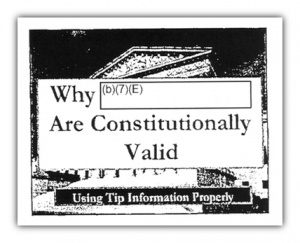Difference between revisions of "US/Freedom of Information Act"
(links) |
(9-11) |
||
| Line 2: | Line 2: | ||
==Post 9/11 Decline== | ==Post 9/11 Decline== | ||
| + | [[image:Constitutional_tips.jpg|right|300px|The [[DEA]] is even redacting the names of its programs...]] | ||
After {{911}}, in the face of the routine [[censorship]] under the "[[war on terror]]" dogma, [[John Young]] reports increasing stonewalling by US government officials and these days almost no information of value is forthcoming. He said in 2013 that he makes only about 1 FOIA request per year and that he thinks that "[[Document:John_Young_Interview|the FOIA system should be closed as a money-wasting fraud]]." | After {{911}}, in the face of the routine [[censorship]] under the "[[war on terror]]" dogma, [[John Young]] reports increasing stonewalling by US government officials and these days almost no information of value is forthcoming. He said in 2013 that he makes only about 1 FOIA request per year and that he thinks that "[[Document:John_Young_Interview|the FOIA system should be closed as a money-wasting fraud]]." | ||
===2014=== | ===2014=== | ||
| − | |||
As an example of the state of [[FOIA]] request denials in 2014, see the example on the right; the [[DEA]] redacted the name of a method its trainers and legal auditors deemed not only constitutional but also palatable to the public. This shielded tactic is “tips and leads paradigm” that is the "primary methodology for protecting [intelligence community] information that is shared with [law enforcement agencies]." The DEA scrubbed all mention of this method throughout the entire document release by claiming FOIA exemption b(7)E, which protects law enforcement techniques from disclosure. Redactions extended even to a separate presentation devoted to the constitutionality of this method.<ref>https://www.muckrock.com/news/archives/2014/feb/04/method-so-acceptable-dea-cant-even-tell-you-its-na/</ref> | As an example of the state of [[FOIA]] request denials in 2014, see the example on the right; the [[DEA]] redacted the name of a method its trainers and legal auditors deemed not only constitutional but also palatable to the public. This shielded tactic is “tips and leads paradigm” that is the "primary methodology for protecting [intelligence community] information that is shared with [law enforcement agencies]." The DEA scrubbed all mention of this method throughout the entire document release by claiming FOIA exemption b(7)E, which protects law enforcement techniques from disclosure. Redactions extended even to a separate presentation devoted to the constitutionality of this method.<ref>https://www.muckrock.com/news/archives/2014/feb/04/method-so-acceptable-dea-cant-even-tell-you-its-na/</ref> | ||
| + | |||
| + | In 2014 U.S. District Court Judge William Zloch questioned the [[FBI]]'s failure to produce court documents requested under the Freedom of Information Act in the matter of [[9/11]], noting that the FBI had | ||
| + | * Provided records with "apparent" and unexplained chronological "gaps." | ||
| + | * Presented to the court "located documents" that "seem incomplete." | ||
| + | * Submitted "summary documents" that "do in fact seem to contradict each other."<ref>http://www.heraldtribune.com/article/20140408/OPINION/304089997?tc=ar</ref> | ||
==UK FOI legislation== | ==UK FOI legislation== | ||
Revision as of 17:15, 13 April 2014
The Freedom of Information Act (FOIA), 5 U.S.C. § 552, was a federal freedom of information law that allowed for the full or partial disclosure of previously unreleased information and documents controlled by the United States government. The act still exists, and FOIA requests are still filed and responded too, in US and in other countries where similar legislation exists.
Post 9/11 Decline
After September 11th, 2001, in the face of the routine censorship under the "war on terror" dogma, John Young reports increasing stonewalling by US government officials and these days almost no information of value is forthcoming. He said in 2013 that he makes only about 1 FOIA request per year and that he thinks that "the FOIA system should be closed as a money-wasting fraud."
2014
As an example of the state of FOIA request denials in 2014, see the example on the right; the DEA redacted the name of a method its trainers and legal auditors deemed not only constitutional but also palatable to the public. This shielded tactic is “tips and leads paradigm” that is the "primary methodology for protecting [intelligence community] information that is shared with [law enforcement agencies]." The DEA scrubbed all mention of this method throughout the entire document release by claiming FOIA exemption b(7)E, which protects law enforcement techniques from disclosure. Redactions extended even to a separate presentation devoted to the constitutionality of this method.[1]
In 2014 U.S. District Court Judge William Zloch questioned the FBI's failure to produce court documents requested under the Freedom of Information Act in the matter of 9/11, noting that the FBI had
- Provided records with "apparent" and unexplained chronological "gaps."
- Presented to the court "located documents" that "seem incomplete."
- Submitted "summary documents" that "do in fact seem to contradict each other."[2]
UK FOI legislation
Similar legislation was enacted by the UK Parliament on 30 November 2000. [3]
References
